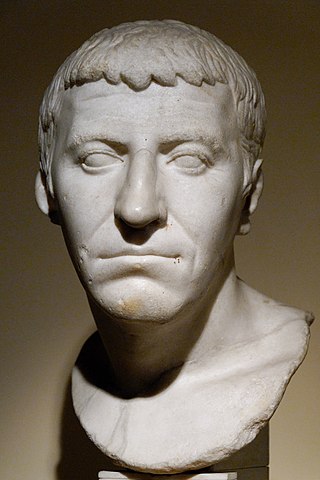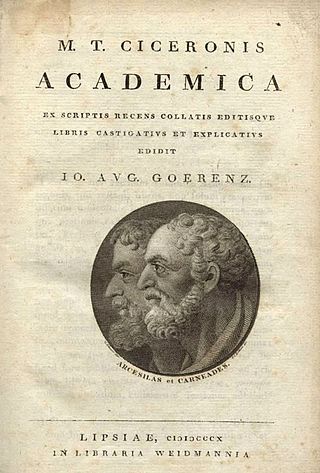Related Research Articles

Epicurus was an ancient Greek philosopher and sage who founded Epicureanism, a highly influential school of philosophy. He was born on the Greek island of Samos to Athenian parents. Influenced by Democritus, Aristippus, Pyrrho, and possibly the Cynics, he turned against the Platonism of his day and established his own school, known as "the Garden", in Athens. Epicurus and his followers were known for eating simple meals and discussing a wide range of philosophical subjects. He openly allowed women and slaves to join the school as a matter of policy. Of the over 300 works said to have been written by Epicurus about various subjects, the vast majority have been destroyed. Only three letters written by him—the letters to Menoeceus, Pythocles, and Herodotus—and two collections of quotes—the Principal Doctrines and the Vatican Sayings—have survived intact, along with a few fragments of his other writings. As a result of his work's destruction, most knowledge about his philosophy is due to later authors, particularly the biographer Diogenes Laërtius, the Epicurean Roman poet Lucretius and the Epicurean philosopher Philodemus, as well as the hostile but largely accurate accounts by the Pyrrhonist philosopher Sextus Empiricus, and the Academic Skeptic and statesman Cicero.

Zeno of Citium was a Hellenistic philosopher from Citium, Cyprus. He was the founder of the Stoic school of philosophy, which he taught in Athens from about 300 BC. Based on the moral ideas of the Cynics, Stoicism laid great emphasis on goodness and peace of mind gained from living a life of virtue in accordance with nature. It proved very popular, and flourished as one of the major schools of philosophy from the Hellenistic period through to the Roman era, and enjoyed revivals in the Renaissance as Neostoicism and in the current era as Modern Stoicism.

Titus Lucretius Carus was a Roman poet and philosopher. His only known work is the philosophical poem De rerum natura, a didactic work about the tenets and philosophy of Epicureanism, which usually is translated into English as On the Nature of Things—and somewhat less often as On the Nature of the Universe. Very little is known about Lucretius's life; the only certainty is that he was either a friend or client of Gaius Memmius, to whom the poem was addressed and dedicated. De rerum natura was a considerable influence on the Augustan poets, particularly Virgil and Horace. The work was almost lost during the Middle Ages, but was rediscovered in 1417 in a monastery in Germany by Poggio Bracciolini and it played an important role both in the development of atomism and the efforts of various figures of the Enlightenment era to construct a new Christian humanism.

Epicureanism is a system of philosophy founded around 307 BCE based upon the teachings of Epicurus, an ancient Greek philosopher. Epicurus was an atomist and materialist, following in the steps of Democritus. His materialism led him to religious skepticism and a general attack on superstition and divine intervention. Epicureanism was originally a challenge to Platonism, and its main opponent later became Stoicism. It is a form of hedonism insofar as it declares pleasure to be its sole intrinsic goal. However, the concept that the absence of pain and fear constitutes the greatest pleasure, and its advocacy of a simple life, make it very different from hedonism as colloquially understood.

Gaius Cassius Longinus was a Roman senator and general best known as a leading instigator of the plot to assassinate Julius Caesar on 15 March 44 BC. He was the brother-in-law of Brutus, another leader of the conspiracy. He commanded troops with Brutus during the Battle of Philippi against the combined forces of Mark Antony and Octavian, Caesar's former supporters, and committed suicide after being defeated by Mark Antony.

The gens Rabiria was a minor plebeian family at Ancient Rome. Although of senatorial rank, few members of this gens appear in history, and the only one known to have held any of the higher offices of the Roman state was Gaius Rabirius Postumus, who was praetor circa 48 or 47 BC.
Gaius Memmius was a Roman politician, orator and poet. He is most famous as the dedicatee of Lucretius' De Rerum Natura, and for his appearances in the poetry of Catullus.

De rerum natura is a first-century BC didactic poem by the Roman poet and philosopher Lucretius with the goal of explaining Epicurean philosophy to a Roman audience. The poem, written in some 7,400 dactylic hexameters, is divided into six untitled books, and explores Epicurean physics through poetic language and metaphors. Namely, Lucretius explores the principles of atomism; the nature of the mind and soul; explanations of sensation and thought; the development of the world and its phenomena; and explains a variety of celestial and terrestrial phenomena. The universe described in the poem operates according to these physical principles, guided by fortuna ("chance"), and not the divine intervention of the traditional Roman deities.
Antiochus of Ascalon was an 1st-century BC Platonist philosopher who rejected skepticism and blended Stoic doctrines with Platonism as the first philosopher in the tradition of Middle Platonism.
Philodemus of Gadara was an Epicurean philosopher and poet. He studied under Zeno of Sidon in Athens, before moving to Rome, and then to Herculaneum. He was once known chiefly for his poetry preserved in the Greek Anthology, but since the 18th century, many writings of his have been discovered among the charred papyrus rolls at the Villa of the Papyri at Herculaneum. The task of excavating and deciphering these rolls is difficult, and work continues to this day. The works of Philodemus so far discovered include writings on ethics, theology, rhetoric, music, poetry, and the history of various philosophical schools. Ethel Ross Barker suggested in 1908 that he was owner of the Villa of the Papyri Library.

Diogenes of Babylon was a Stoic philosopher. He was the head of the Stoic school in Athens, and he was one of three philosophers sent to Rome in 155 BC. He wrote many works, but none of his writings survived, except as quotations by later writers.
Ancient Roman philosophy is philosophy as it was practiced in the Roman Republic and its successor state, the Roman Empire. Roman philosophy includes not only philosophy written in Latin, but also philosophy written in Greek in the late Republic and Roman Empire. Important early Latin-language writers include Lucretius, Cicero, and Seneca the Younger. Greek was a popular language for writing about philosophy, so much so that the Roman Emperor Marcus Aurelius chose to write his Meditations in Greek.
Catius was an Epicurean philosopher, identified ethnically as an Insubrian Celt from Gallia Transpadana. Epicurean works by Amafinius, Rabirius, and Catius were the earliest philosophical treatises written in Latin. Catius composed a treatise in four books on the physical world and on the highest good. Cicero credits him, along with the lesser prose stylist Amafinius, with writing accessible texts that popularized Epicurean philosophy among the plebs, or common people.
Gaius Amafinius was one of the earliest Roman writers in favour of the Epicurean philosophy. He probably lived in the late 2nd and early 1st century BC. He wrote several works, which are censured by Cicero as deficient in arrangement and style. He is mentioned by no other ancient writer but Cicero. In the Academica, Cicero reveals that Amafinius translated the Greek concept of atoms as corpusculi in Latin.

De Natura Deorum is a philosophical dialogue by Roman Academic Skeptic philosopher Cicero written in 45 BC. It is laid out in three books that discuss the theological views of the Hellenistic philosophies of Epicureanism, Stoicism, and Academic Skepticism.
Metrodorus of Stratonikeia (Caria) was at first a disciple of Epicureanism, but afterwards attached himself to Carneades. His defection from the Epicurean school is almost unique. It is explained by Cicero as being due to his theory that the scepticism of Carneades was merely a means of attacking the Stoics on their own ground. Metrodorus held that Carneades was in reality a loyal follower of Plato. Cicero speaks of him as an orator of great fire and volubility. He flourished about 110 BC.
Alexinus of Elis, was a philosopher of Megarian school and a disciple of Eubulides. From his argumentative nature he was facetiously named the wrangler, From Elis he went to Olympia, hoping to found a sect which was to be called the Olympian, but his disciples soon became disgusted with the unhealthiness of the place and their scanty means of subsistence, and left him with a single attendant.
David Neil Sedley FBA is a British philosopher and historian of philosophy. He was the seventh Laurence Professor of Ancient Philosophy at Cambridge University.
The gens Amafinia or Amafania was a Roman family during the late Republic. The best-known member of the gens was Gaius Amafinius, one of the earliest Roman writers in favor of the Epicurean philosophy. Cicero considered his works deficient in arrangement and style.

The Academica is work in a fragmentary state written by the Academic Skeptic philosopher, Cicero, published in two editions. The first edition is referred to as the Academica Priora. It was released in May 45 BCE and comprised two books, known as the Catulus and the Lucullus. The Catulus has been lost. Cicero subsequently extensively revised and expanded the work, releasing a second edition comprising four books. Except for part of Book 1 and 36 fragments, all of the second edition has been lost. The second edition is referred to as Academica Posteriora or Academici Libri or Varro.
References
- ↑ Elizabeth Rawson, Intellectual Life in the Late Roman Republic (Johns Hopkins University Press, 1985), pp. 23 and 284.
- ↑ Charles Brittain, Cicero: On Academic Skepticism (Hackett, 2006), p. 134 online.
- ↑ Academica Posteriora 1.2: nullam denique artem esse nec dicendi nec disserendi; Barbara Price Wallach, Lucretius and the Diatribe against the Fear of Death: De rerum natura III 830–1094 (Brill, 1976), p. 5, note 10 online.
- ↑ C.E. Manning, On Seneca's Ad Marciam (Brill, 1981), p. 15, note 21 online.